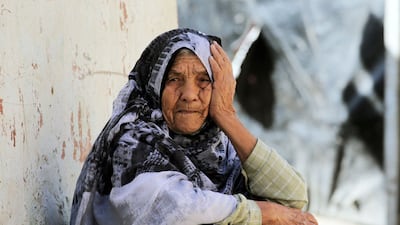Live updates: Follow the latest on Israel-Gaza
Gazans who lived through the mass dispossession of Palestinians in 1948, which is known as the Nakba, said the catastrophe facing Gaza today is the worst they have experienced.
Palestinians marked Nakba Day on Wednesday, 76 years since the war that led to the creation of Israel that resulted in more than 750,000 Palestinians fleeing or being driven from their homes.
Many took refuge in what would later become the Gaza Strip and the West Bank, and have since lived under Israeli occupation and multiple wars, including the continuing conflict in Gaza, in which more than 35,200 Palestinians have been killed since October.
"Our current catastrophe is unlike anything we've experienced before," said Zaher Al Najjar, 81, who comes from the town of Huwwara near the northern Gaza Strip.
He was five years old when the Nakba occurred.
"I lived through all the Arab-Israeli wars, but a war like this, I have not seen since the first catastrophe in 1948,” he told The National.
Other elderly Palestinians who spoke to The National agreed that the continuing war was the worst they had seen.
“The war in Gaza now is different than in 1948,” recalls Abu Nazer Zidan, 80, who was four years old in 1948 when he left his village and came to Gaza with his parents and older brother.
His village, Al Masmia, became part of the state of Israel, and his family relocated to the densely populated Gaza Strip.
"This is different. Now all we feel is fear. But before, when we left our lands and entered Gaza, we didn't experience the constant fear of being killed," Mr Zidan said.
He said that while his family had faced difficult conditions upon their arrival in Gaza, the UN agency for Palestinian refugees, UNRWA, supplied them with everything they needed at the time.
Now, he said Palestinians were being forced to desperate measures to survive as Israel limits the amount of food entering the enclave.
"In this war, we ate animal feed, and no one came to inquire about us. Israel is implementing a policy of hunger against us, aiming to exterminate all Gazans or force them to immigrate," he said.
He is currently living with relatives on Al Nasser Street in Gaza city and while he hopes to return to his home, he is unable to as Israeli troops fight Hamas in locations across the enclave.

The majority of Gaza's 2.3 million civilians have been forced to evacuate their homes, many on multiple occasions, as Israel shifts its military operations around the enclave.
Mr Al Najjar is one of them.
"In the first catastrophe in 1948, I migrated once with my family and lived in Jabilia camp. But in this war, I migrated with my family more than 6 times, with over 50 family members, from Jabilia camp to various places, then to Gaza, back to Jabilia, then Gaza again, and now they've evacuated us from the camp,” he said.
He also said that the levels of killing and death were much higher now than in 1948.
“In this war, the situation is catastrophic, and death is the easiest thing. We suffered from hunger, death, poverty, and loss of homes during this war," he said.
Mr Al Najjar lost his daughter Samia and three of her children, along with his nephews.
“In 1967 and other wars, the situation wasn't like this; everything was easier, with less death and harm."
It comes as the Palestinian Central Bureau of Statistics said on Wednesday that Israel has killed 134,000 Palestinians and Arabs in Palestine since 1948. The number includes the more than 35,000 Palestinians who have been killed since the current war erupted on October 7.
About one million Palestinians have been detained since 1967, the Palestinian Bureau said.
Zahia Shaheen, 80, came to Gaza after fleeing her village of N'alia when she was four with her family.
"The catastrophe is not what happened in 1948; the catastrophe is what's happening today, and I lived through those days and know what I'm talking about," Ms Shaheen told The National.
"Life was better back then, even though the pain was great. I was young, but I saw the pain and suffering in the eyes of my elders as they lost their land, homes as livelihoods," she said.
Ms Shaheen witnessed her father and grandfather losing their livelihoods and everything they have worked for.
"They went from being respected elders in their village to refugees waiting in line for Red Cross or UNRWA aid," she said.


